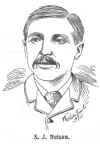saying he would by their meal if he (Oliver) would sell it out for him.
Oliver said no; if be wanted the meal he (Oliver) had the money to buy it.
Shortly after this, perhaps the same evening, some of the party came back to Oliver's with the meal, stating that Chapman had purchased it and requested them to leave it there for him.
After unloading it they again departed for the west.
Oliver never saw Chapman alive after that, but his idea of the murder, which is also shared by John Kelly, Sol Marsh, Charley Hillsinger and other old settlers who were here at that time, is that when Chapman paid for the meal he displayed his money and they (Cox and party) returned on the night of May 2 and committed the murder.
Jerome Cox had come into this country in September, 1872, and settled on the land now owned by Jim McKee on Crooked Creek, fifteen miles southeast of Norton.
He was from Macon county, Missouri. He spent most of his time in hunting and trapping.
He was looked on as a horse thief and a bad citizen in general, but no one knew positively of any crimes he was implicated in until he left here in 1874.
He then went to Cloud county, Kansas where he and a man by the name of Charley Hudson, stole a span of horses near Concordia and came back through Norton.
The sheriff of Cloud county followed them up here and succeeded in capturing Hudson and the horses a little west of Norton.
Hudson was sent to the penitentiary for five years, but Cox got away and has never been heard of in this country.
Chapman was getting old, perhaps near 60, at the time he was murdered. As he had no relatives in this country no one took any special interest in looking for the murderers.
No one was ever arrested for the crime. It would appear from the circumstances as related to us by men who were here, that there would have been no trouble for the officers to have apprehended the criminals.
That they made no effort to do so certainly reflects seriously on some of the officials, especially Billings, who a short time before this got the county organized for the purpose, as he said, of maintaining law and order; and this closes the history of one of the most hideous crimes ever committed in Norton County.
 Sween John Nelson was born at Storabroba, Sweden, June ?, 1855. After his mother's death, which occurred in 1867, John decided to come to America.
In the fall of 1868, when only thirteen years of age, he landed in New York.
He went to Cattaraugus county, that state, where he stayed four years working for his board and attending district school.
He went to Illinois in 1872 and from there to Norton county, Kansas, in March 1873.
He took a claim on Battle Creek, two miles north of Calvert. In 1883 he bought the John Lumberg farm that joined him on the west, which
Sween John Nelson was born at Storabroba, Sweden, June ?, 1855. After his mother's death, which occurred in 1867, John decided to come to America.
In the fall of 1868, when only thirteen years of age, he landed in New York.
He went to Cattaraugus county, that state, where he stayed four years working for his board and attending district school.
He went to Illinois in 1872 and from there to Norton county, Kansas, in March 1873.
He took a claim on Battle Creek, two miles north of Calvert. In 1883 he bought the John Lumberg farm that joined him on the west, which
|